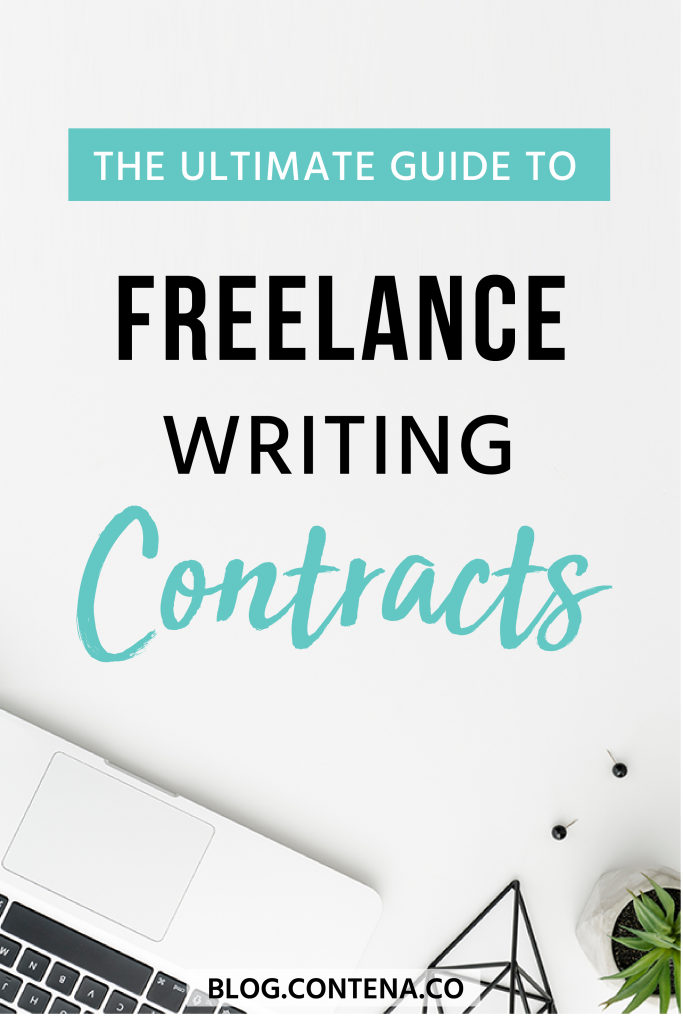After careful pitching and negotiation, you’ve landed a sweet gig. Congrats! Now all that’s left is for you to get writing, right?
Wrong. Slow your roll writer, you’re missing a very important step.
The contract.
Contracts are vital to sustaining a successful freelance business. They most essentially protect your time and earnings. Without one, you may find yourself chasing down clients for payment, having work added outside of your agreement (the dreaded scope creep) and other forms of flat-out being taken advantage of.
Drafting one up can seem like a very daunting process but it really doesn’t have to be. Freelancers draft up their own agreements quite commonly and so can you. Today we’re going to break down the basics you’ll want to cover as well as some other points to consider.
I do have to start off by saying I’m in no way shape or form a lawyer. If you’re looking to craft an ironclad contract, you’d do best to contact a professional.
Contract Versus Agreement
Many times the terms “contract” and “agreement” can be used interchangeably. The point of having either is having agreed to terms in writing.
A contract may be more formal and include more legalese where an agreement may seem more palatable to those without a legal background.
Agreements are often referred to as letters of agreements. They are typically written in letter format. Contracts most often include lettered or numbered sections and subsections and are worded in mostly layman’s terms.
Both will go a long way to protect your interests, work, and time and should be considered a must-have as a freelancer.
The Basics of a Freelance Writing Contract
Regardless of the format you choose, any contract or agreement should include some basic details.
Overview
In this section, you want to outline the agreement best you can. What is the project you’re being hired for? Is it one article? Three? How long is each expected to be? Do you include links within your piece? Are you expected to promote on social media outlets?
Being thorough is the key idea here. Be sure to list out as many details as you can.
Scope of the Work
Scope creep is a problem that many freelancers contend with. The creep occurs when a client asks for more than what was agreed upon. It usually occurs as “small asks” but can quickly snowball.
For example, after agreeing to terms, the client may ask to include a graphic or promote on social media or something else you otherwise would have billed for.
Getting precise details of what types of work are included in your contract is a surefire way of avoiding this issue. By outlining what both you and your client agreed to, you can quickly refer back to your agreement whenever a creep begins.
Edits
One common issue addressed in any agreement is the number of edits. Most times, freelancers will include a round of edits in the agreed upon price. If further rounds are requested, it would be an additional charge. When this is plainly stated in your agreement you can avoid potential issues with over-zealous clients.
Having the number of edits included clearly stated in writing becomes especially helpful when you have a finicky client who changes their mind often. Having this written into your contract helps avoid a lot of unnecessary (and unpaid) work.
Dates
List out important dates as they pertain to your project. This includes dates for drafts, finished products, edit turnaround, and payments.
Be sure you have a clear understanding of what should happen when. Does the client expect work on a specific date or on a rotating basis such as the third Monday of each month? Will you be paid upon submission or after publication? Details matter!
Delivery Method
How does the client want to receive the work? In some cases, the client may wish to the finished product as a word document so they can format it as they’d like where others prefer to have the writer format and publish on their platform.

Payment Details in a Contract
Outlining payment in a contract goes beyond stating “X amount of dollars for said project.” There are many items to include and consider. While not all terms will suit your needs or situation, the following are important ones to examine.
Total Amount
In this section, you lay out the general agreement on what amount will be paid, by whom. State your rate (hourly, flat, per word) along with the total cost.
Down Payments
Down payments are when a client pre-pays for a portion of the work. While it may seem daunting to ask this of a client at first, it’s actually pretty standard for the industry.
Depending on the scope of the project, a typical down payment ranges from 25-50% of the total cost. Down payments work exceptionally well for projects that are larger or stretch over extended periods of time.
Retainers
Retainers, they’re not just for lawyers!
Usually set in place for projects that occur regularly (think: anchor clients), retainers take out the worry of having to chase down unpaid invoices. Many freelancers opt for replenishing retainers especially if they’re billing at an hourly or flat-fee rate.
For a replenishing retainer, a client deposits a set amount of money into an account which the freelancer bills against. Once the account has reached a predetermined amount, sometimes known as the stop-work amount, the client replenishes the fund, ensuring ongoing work.
When writing a retainer into an agreement be sure to include the stop-work amount clearly (and that you stick to it).
Kill-Fee
Another form of payment protection commonly found in a freelance writing contract is the kill-fee clause. This outlines that you will be paid a certain amount for work that was already done, even if the client decides to pull the plug on a project. Kill fees can sometimes replace the need for a downpayment for shorter-term projects.
Late Fees
Self-explanatory late fees structure penalties the client (or freelancer) would need to pay if payment (or product delivery on your part) is delayed. Just including this clause often acts as a motivation for clients to keep track of your invoices and pay up on time.
Merger Clause
Often times there’s a lot of back and forth between a freelancer and their client as they hash out the project. One side may take meticulous notes and while the other might not. So who’s to say what was agreed upon and what wasn’t? That’s where the merger clause comes in.
A merger clause clearly states that what is written in the contract is the entirety of the agreement. Because it leaves no question about what’s covered, both you and your client have clear expectations. Plus, it’s especially helpful in avoiding scope creep because when “small asks” come up, you can refer back to the document.
As a counterpart to the merger clause, you also may choose to add some language about amendments to the agreement. The premise behind this term is whatever project changes or additions made over email, phone, slack, etc. must be added in writing to the contract in order to be honored.
Especially with developing projects, points and ideas can come up after the ink is dry on the contract. By adding an amendment section, you allow for developments in the project while still ensuring you can be compensated for any additional work. It’s also another step you can take to help protect yourself from the dreaded scope creep.
Attorney fees
While the idea of contracts is to prevent you from getting burned by a client, it sadly still happens from time to time. You can add an extra layer of protection by adding language about attorneys fees.
If a client breaks a contract, taking them to court can significantly eat away at your bottom line. Adding in coverage of attorneys fees can give you peace of mind knowing that in the event you do have to go to court, that the cost won’t fall on you.
As with many of these terms, just having it included acts a deterrent for “bad behavior” on a clients part.
Get a second look
If you’re looking to go DIY with your contract but worry it may not be up-to-snuff, you can always get it reviewed. Often cheaper than retaining a lawyer to draft up the entire contract, having it professionally reviewed can help ensure your key concerns are covered.
There are a lot of agencies that can help answer contract-specific questions and even help you find a qualified lawyer like the Freelancers Union and the American Society of Journalists and Authors. Make sure you look locally, as laws vary by city and state.
If you do choose to have your contract reviewed, also be sure to enlist the help of a lawyer who has experience working with freelancers and/or contract law.
NDAs
An NDA (non-disclosure agreement) is a legally binding agreement where certain information is deemed confidential and therefore cannot be disclosed. It’s vital to understand what information is considered confidential as well as how long it is in effect.
While it may seem common sense that freelancers be disallowed from disclosing “trade-secrets”, the wording of these can be a bit tricky and should be understood fully before signing.
Depending on the wording, it’s possible the client may include information given by a third party or otherwise available in the public realm, as being confidential.
Be wary of overly-vague wording. Signing a vague NDA can end up in some hot water, even being financially on the hook for a variety of offenses.
Clarifying what information the client deems confidential is an essential step in deciding if signing is right for you.
Non-competes
Non-competes are clauses that allow the client to prohibit who you work for now and in the future. Most often non-competes refer to direct competitors, which is understandable. However, proceed with caution because the scope of the limitations can potentially and permanently close off an entire niche.
Both NDAs and non-competes are things you need to evaluate carefully before agreeing to as they have the potential to immensely inhibit your earning potential moving forward. If you find one of these in your contract consider negotiating to have it removed altogether.
Before we wrap up, I’d like to reiterate my disclaimer.
I’m a writer, not a lawyer.
If you have questions or concerns about the legalese or what is or is not legally binding, call a professional.
However, from one writer to another, these tips should get you going in the right direction. Contracts and agreements may seem scary, but they really don’t have to be. It’s well worth the time to protect yourself.










